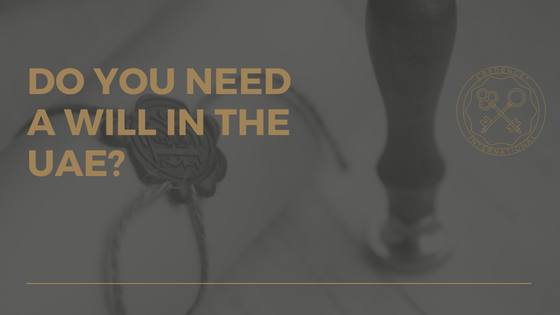Do You Need a Will in the UAE?
Non-Muslim expats living in the UAE are likely to have wills drafted in their home country, to distribute their assets accordingly if the worst comes to worst. However, it is so important to take account of the fact that in the UAE, these home-country wills may not apply to your UAE assets, while Sharia law could be applied to your wealth.
Under UAE Inheritance Law, if you have no will in the country, any estate owned will be passed in accordance with ‘ancient’ statutory laws based on Sharia principles. For example, if the husband dies in a family, the wife will receive 1/8th of the outstanding wealth, the parents receive 1/6th each, and the sons/daughters shall receive any remainder in the ratio of 2:1 respectively. If the wife dies however, the husband receives a quarter of her wealth. Some expats may therefore wish to apply for their own will to decide upon a wealth distribution that fits them.
Guardianship laws provide another reason for drafting a new will in the UAE. Sharia principles dictate that if a husband dies, while the custody of a child under the age of 21 may fall to the wife, guardianship can only fall to a male. This means that either a grandfather- or brother-in-law may have greater rights over a child than a mother, as guardianship refers to the authority to make important decisions, whether that be financial, educational or travel related. In contrast, custody only refers to who the child physically resides with. Again, the best way to secure and protect your family in the case of a tragic event is to plan ahead and draft a will in the UAE. By doing so, one can specify who guardianship should fall to in such a scenario.
How can this be achieved? Under Dubai Law No. 15 of 2017, the DIFC Wills and Probate Registry (DIFC WPR) had its authority reaffirmed to provide wills to non-Muslims that are registered under internationally-recognised common-law principles. This has provided an innovative solution to expats who previously had no legal certainty of where their UAE assets would go after death. DIFC Wills are registered using the inheritance laws of the home country of the expat in question, meaning reliability and certainty can be provided by the service. Whilst the cost for this is not insignificant (AED 10,000 for a single will, AED 15,000 for a mirror will and AED 550 to update an existing policy), this is often a very worthwhile investment for residents who hold significant assets, such as property in the UAE.
According to a 2017 DIFC WPR survey, around 60% of respondents don’t see Dubai as their permanent home, but 64% of expats stay in Dubai much longer than they initially planned. Additionally only 10% of expats had a UAE registered Will. This fact further illustrates how sensible financial planning is so important – preparing for the worst is the best way to protect your family and assets.
If you have any further questions about applying for a will in the UAE, or are seeking advice about the issue, contact Graeme Field (Director and Head of Corporate Services, Credence International) at [email protected]

